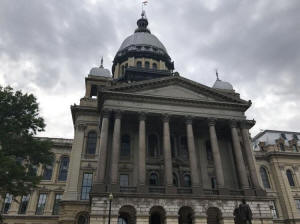Measure would ban non-disclosure agreements in Illinois economic
development deals
 Send a link to a friend
Send a link to a friend
 [January 08, 2022]
By Kevin Bessler [January 08, 2022]
By Kevin Bessler
(The Center Square) – State
and local governments in Illinois spend millions every year on economic
subsidies, but a new bill would eliminate non-disclosure agreements in
those deals.
Senate Bill 3038 would prevent government bodies from entering into
non-disclosure agreements (NDAs) in economic development deals.
Supporters of the measure said it would eliminate a tactic that allows
businesses to secretly lobby while negotiating deals without the
knowledge or input of local residents.
“I think the public would disapprove of most of them, I think many of
them are too expensive, and one of the ways companies engineer them to
be too expensive is by keeping them secret,” GoodJobsFirst Executive
Director Greg Leroy said.
Leroy said every incentive deal should be fully disclosed at least 90
days before it is approved.
John Mozena, president of the Center for Economic Accountability, said
the argument that companies might be put at a disadvantage if the
details are revealed is not valid.
“Given that they are looking for a competitive advantage in the form of
free money from government and from taxpayers, I would consider that
just part of the price of doing business,” Mozena said. These NDAs tend
to be in practice much less about protecting the businesses from the
scrutiny of competitors and more about protecting bureaucrats and
politicians from the scrutiny of voters and taxpayers.”
[to top of second column]
|

The Illinois State Capitol in Springfield, Illinois.
John Spataro | Watchdog.org
 Similar bills have been introduced
in Florida and New York, but it is a different story in nearby
Michigan.
Before Michigan lawmakers rapidly considered and approved a $1
billion fund for new business incentives in December, 13 lawmakers
agreed to stay silent about the process. The state’s development
arm, the Michigan Economic Development Corp., asked lawmakers from
both parties to sign “confidentiality agreements” that would keep
secret for five years any non-public details about four potential
projects.
Confidentiality agreements are common in economic development, but
agreements with lawmakers take NDAs to another level.
“Public money deserves public scrutiny,” Mozena said. “Venture
capitalists, hedge fund managers and bank loan offices wouldn’t
invest without knowing who was getting the money, and American
taxpayers deserve at least the same level of basic transparency from
their economic development agencies.” |